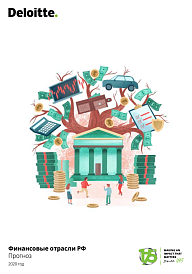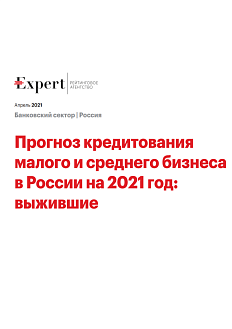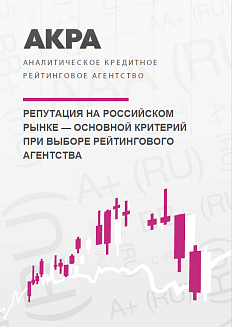The banking sector: Results of 2019 and outlook for 2020
Due to an economic slowdown in 2019, growth in the financial industry was limited across all sectors. Deloitte analysts predict that banking will remain the leading sector by the volume of assets and the rates of innovation testing and implementing.
Due to a more challenging economic and competitive environment, changes in the legal framework, and close attention given by the Central Bank to financial stability, the number of credit institutions in Russia decreased from 834 in 2015 to 442 at year-end 2019. In 2019, the Central Bank announced that it had completed the active phase of the «sanitation» of the banking sector. So, Deloitte analysts believe, further decrease in the number of credit institutions in 2020 is unlikely to exceed 10%.
According to Deloitte, the rate of growth of bank assets will be slightly higher in 2020 although it will not reach the 2017-2018 level. Assets are projected to grow by 5% in 2020 due to a rise in credit activity both in the retail and the corporate sectors, particularly in the segment of loans for SMEs because it will be stimulated by government support measures.
The insurance sector: Results of 2019 and outlook for 2020
The growth in the insurance sector slowed down in 2019 because of new regulatory norms concerning mandatory vehicle insurance (OSAGO) and life insurance, the two largest market segments. This resulted in smaller average premiums and tougher competition.
The trend towards market consolidation continued in 2019 because licenses of some market participants were relinquished or revoked. The market share of five largest companies increased by 7.8% over three quarters of 2019. Strict competition and economic deceleration are having a negative effect on small and medium-sized market players, reducing their number.
Deloitte experts consider it possible that new legal provisions about regional programs of home emergency insurance will be introduced in 2020. If this type of insurance becomes mandatory, this will probably bring a growth in the property insurance segment.
In 2020, the lower limit on charter capital for insurance companies will continue to be gradually raised. Notably, the requirements will differ depending on the market segment. For example, starting from 1 January 2020, the minimum charter capital of life insurance companies will be set at 310 million rubles, while reinsurers will be required to have at least 520 million rubles. Deloitte analysts believe that this may lead to a further consolidation in the sector.
The pension sector: Results of 2019 and outlook for 2020
In 2019, the total volume of funds in the pension system exceeded 6 trillion rubles. The share of non-state pension funds (NPFs) in the pension system was 69%.
The investment mix of NPFs is shifting towards corporate bonds. Over nine months of 2019, the share of this type of bonds in NPF investment portfolios increased by 12.7%. At the same time, NPFs are showing an interest in government securities. The share of this investment vehicle soared in 2018, and Deloitte analysts expect a further moderate growth in 2020.
In view of the changing investment portfolio structure of NPFs with a shift towards corporate bonds, the Pension Fund of the Russian Federation has started to build up the volume of monetary assets and government securities in its portfolio.
The leasing sector: Results of 2019 and outlook for 2020
In 2019, the leasing sector was reliant on the activity of major market players, STLC (State Transport Leasing Company) and Sberbank Leasing. In the absence of large deals in the rail and aviation segments, growth in new businesses declined four-fold compared to 2018. In 2020, Deloitte experts believe, the growth will be sustained by deals in smaller segments, such as car leasing and real property leasing.
Car leasing deserves special mention because this segment has been following an upward trend for the last four years, largely due to active financing of deals with small and medium-sized entreprises. Despite the dependency on state subsidies, the growth in the share of cars and trucks in new businesses in 2020 is unlikely to fall below the level of 2019 even in case the subsidies are reduced. This is due to the fact that lease financing for vehicles remains popular among customers.
The microfinancing sector: Results of 2019 and outlook for 2020
Microfinancing is a fairly competitive segment. Although it was the object of strict regulatory control in 2019, its profitability remains high. In 2019, microfinance institutions (MFIs) were obligated to calculate the debt load of their borrowers. Also, the regulator imposed an upper limit on daily rates for payday loans and daily payouts. Despite this, the microfinance segment remains attractive for new market players.
Deloitte experts observe that banks are displaying an interest in micro loans by participating in this segment through subsidiary MFIs, both to attract new customers and to offer new products to their current clients. At the moment, banks are making use of the regulatory differences between banks and MFIs to give private individuals short-term loans at higher rates and with a higher commission in the microfinance segment because it is more profitable for the creditor. Also, bank-owned MFIs can be used to test new products in new market segments.






